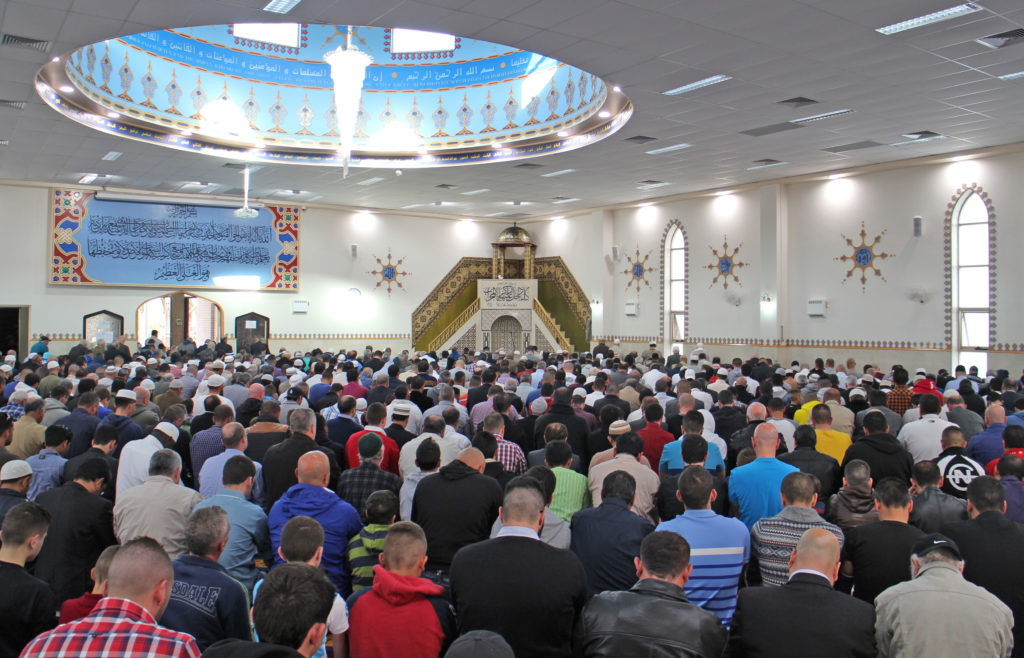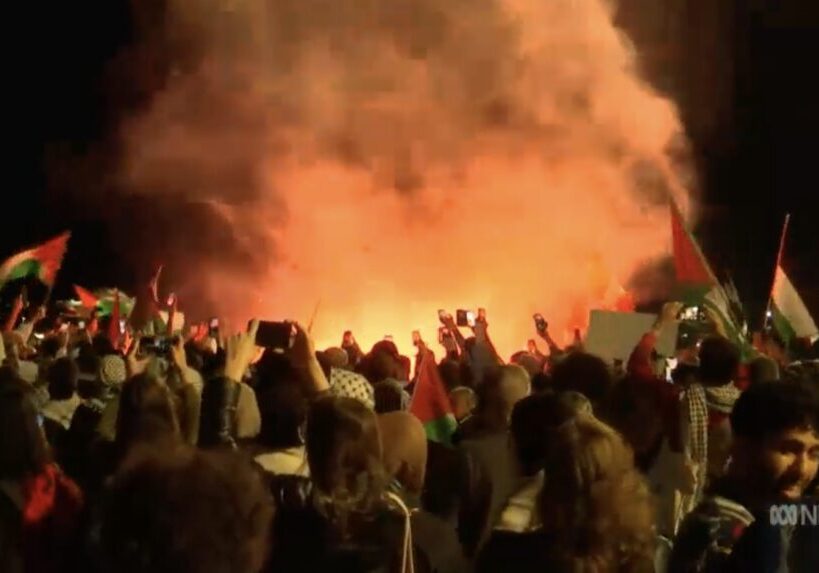Australia/Israel Review
When Muslim Antisemitism comes to Australia
Jun 2, 2016 | Tanveer Ahmed

Tanveer Ahmed
As a boy, I spent many a Friday prayer in mosques hearing clerics wax lyrical about Jewish conspiracies and their intent to dominate the world and rid it of Islam. Descriptions of Jewish wealth, miserliness and hooked noses were commonplace. It just seemed normal and I didn’t think twice about it until I started meeting Jews in high school, even being invited to my first bar mitzvah in Year 7.
There is a story told by Muslims to each other, repeated in sermons and conversations, one I remember hearing as a child, that Muhammad gloriously slaughtered hundreds of Jews.
After defeating an invading army in Medina, Muhammad allegedly turned on the Jewish residents of the Banu Qurzaya tribe, who had remained neutral in the battle. He picked hundreds of the men and murdered them before dividing the spoils of conquest, varying from women to horses, amongst his Muslim followers. The tale is not recounted in the Koran but is in the Hadith and the Sira, which is the biography of the Prophet, and is spoken about as a source of pride among clerics and scholars. There is no record of it in any Jewish historical documents.
Recent controversies in the UK have raised the prospect of antisemitism in Muslim communities and, as a consequence, a greater tolerance of it in UK Labour and other leftist parties, which those of Muslim origin overwhelmingly vote for. There is a growing view among Jews that the British Labour party no longer has a place for them, illustrated by prominent British figures such as author Howard Jacobson withdrawing their support.
In Britain the dispute began when two leading figures were suspended from the Party for making what were considered antisemitic remarks. Bradford politician Nazeem Shah suggested in a social media posting that Israel be relocated to the United States and former London Mayor Ken Livingstone tried to defend Shah by claiming Adolf Hitler was in fact a Zionist. Earlier in the year, the Labour Party opened an investigation into the Oxford University Labour Club before suspending several councillors and activists for antisemitic remarks.
The proportion of Muslims in the United Kingdom is greater than in Australia – 5% compared to 2%. In London the proportion is closer to 12%. But the concentration of Australian Muslims in outer metropolitan areas, primarily in Sydney and Melbourne, many of which are marginal seats, make them an electorally significant group. There is evidence that the growth of Muslims in the electorate is not only affecting ALP policy towards Israel, but increasingly allowing a greater tolerance of antisemitism.
For example, at the NSW ALP State Conference earlier this year almost half of the policy resolutions raised in relation to foreign policy concerned Israel and were critical. Israel was mentioned more in the official document pertaining to the State Conference than jobs or the economy.
As Sharri Markson documented in the Australian newspaper in February, NSW Labor MP Shaoquett Moselmane described pro-Israel advocacy groups as “cancerous” and “malicious” saying they aim to “misinform and scaremonger”. The words weren’t uttered on social media or private meetings but in the halls of Parliament. Nor were they met with any kind of censure or rebuke from ALP officials. Moselmane is now a vocal advocate for a ban on any Labor MP visiting Israel if funded by Jewish organisations.
While there are figures like Dr. Jamal Rifi who have spoken out against conflating anger towards Israeli policy with anger towards Jews, such figures are few and far between and immediately risk being isolated or, as Dr. Rifi has experienced, being labelled as an “Uncle Tom”. There is a considerable culture of denial among both Muslims and non-Muslims regarding the scale of the problem.
It is not that the Left is increasingly packed with antisemites, but there is a growing accommodation of antisemitic expression and not nearly the same intolerance of it as there may be towards perceived racism towards Muslims.
There can be little doubt antisemitism is increasing. A 2014 report by the Executive Council of Australian Jewry showed physical attacks had increased 200% since the previous year, threatening emails 180% and property damage 66%. Nor can this rise be blamed just on Muslims. White supremacist groups have also spouted such hate towards Jews and the so-called “unholy alliance” between some Leftists and Muslims has encouraged so called progressives to occasionally slip into antisemitic territory.
Who could forget last year’s Sydney University altercation involving Professor Jake Lynch waving money in the face of a Jewish woman and his students ambushing retired British Colonel Richard Kemp? Students shouted in the face of the distinguished former British soldier that he was supporting genocide.
The double standard amongst media elites was further illustrated by the furore over a column by Tim Blair last year in which he exposed the antisemitic literature in one of Sydney’s largest Islamic book stores in Lakemba. Illustrating the growing tolerance of antisemitism within the framework of identity politics – where Jews now supposedly have a powerful, privileged status and therefore do not warrant sympathy – there was an enormous backlash from leftist commentators, all of whom paid mere lip service to the existence of the literature itself.
As British thinker Kenan Malik wrote in the New York Times during the recent London mayoral campaign, antisemitism was historically a greater problem within the Right, whereas the Left could proudly draw on its egalitarian principles and much firmer tradition of fighting bigotry against Jews and racial minorities.
But there has been a retreat from such values in line with a greater emphasis on multiculturalism and a society divided into distinct groups with their own beliefs and values. Once this kind of identity politics has become paramount, people are more often judged by what group they belong to. As a result Jews are increasingly held responsible for the actions of Israel.
The growth of Muslim minorities in Western populations is complicating matters surrounding antisemitism and policy responses to defuse it. Beyond the scriptural basis in Koranic or Hadith texts, Muslim antisemites also rely on the Protocols of the Elders of Zion, the infamous document about Jewish conspiracy which was determined to be a forgery created by the Russian secret police in the early 20th century. Yet it remains a bestseller in the Middle East and among Muslims living in the West.
In 1951, the intellectual father of Islamism Sayyid Qutb wrote an essay decrying Jews as the natural enemy of Islam, intent on destroying Muslims, and described the creation of Israel as the manifestation of Jewish revenge for being humiliated in Medina during the time of Muhammad.
Ira Forman, US State Department Special Envoy to Combat Antisemitism, warns that smaller Jewish communities in countries like Holland, Norway and Sweden are increasingly feeling under threat and there is a steady trickle of Jews migrating to Israel. He warns that this trickle may become a flood if antisemitism continues to rise in parallel with the surge in Muslim migrants.
As Benjamin Kerstein writes in the Jerusalem Post, modern antisemitism is primarily a Muslim problem. He writes of the new antisemitism as a combination of hatred of Israel and its Jewish supporters, petty stereotypes and, perhaps most worryingly, the moral delusions of those like Professor Jake Lynch who believe they are standing up for oppressed victims through confronting Jewish supporters of Israel.
“Muslims are a minority in the West and no one likes to point out that a minority can be as hateful and racist as a majority,” writes Kerstein.
In his book, The Jew is Not My Enemy, Pakistani-Canadian author Tarek Fatah observes that decades ago, when he was growing up in Pakistan, antisemitism was not particularly visible, whereas during a recent trip to Lahore, he landed to see a man holding up a sign claiming that the Jews were responsible for bird flu. He goes on to relate multiple encounters with Pakistani elites who were unanimous that the Mossad was responsible for the 2001 World Trade Centre attacks, citing the supposed several thousand Jews missing from work that day as irrefutable evidence.
In Fatah’s book, he cites sobering encounters where Muslims take considerable risk to attack Jewish targets specifically, such as when Pakistani terrorists invaded Mumbai and took a risky detour in order to target a Jewish cultural centre. The shooting in the Jewish supermarket in the Parisian suburbs during the orchestrated Paris attacks was a further such example.
His account of the changing trends of antisemitism in the Islamic world is evidence that the roots of Muslim antisemitism cannot be identified solely in scriptural or even religious roots. Its growth in recent decades has occurred in direct parallel with the threat and growth of Islamism. There is considerable evidence to suggest, much like my own personal experience in a South Asian Muslim community, that hate and suspicion have been bred from a young age.
Just as Islamism is rooted in civilisational humiliation, so the nexus between antisemitism, Jews and Israel has direct overlaps with the grievance politics within the Islamic world. Israel and its conflict with the Palestinians is represented as the single greatest symbol of the Muslim world’s failure to flourish and its perceived domination by the West. It is a global trend that is beginning to make its mark locally – and its primary potential political outlet will be in the Australian Labor Party and the cultural institutions that support it.
Dr. Tanveer Ahmed is a Bangledeshi-born Australian psychiatrist and author, and a regular commentator in both print and electronic media. He is an elected councillor at the City of Canada Bay, NSW.
Tags: Antisemitism






